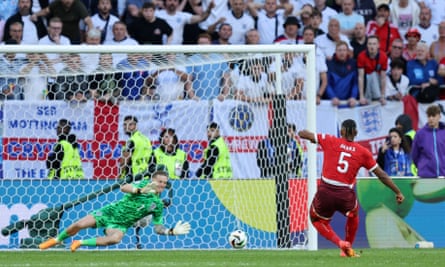What happened here, exactly? England, absurdly, are in another semi-final, their third in four tournaments under Gareth Southgate. Does it feel good? Kind of. A bit. Maybe not. It depends which part of this weird, gruelling, unexpectedly joyful evening in the green fringes of Düsseldorf you choose to focus on.
There will be time, so much time, to delve into the agonies, the vagueness, the sense of a team spending 120 minutes trying to put on a jumper, realising it’s back to front, then realising it doesn’t have any arms, then realising it’s actually an ironing board cover. The good parts first.
One of these was Jordan Pickford. Pickford was Southgate’s first real leap of faith with England (is there a study to be made of the career trajectories of managers who immediately leave Joe Hart out of their team?). Pickford has been very good. In this tournament he has been England’s most reliable player. And here he had another wonderful moment, saving the penalty in the shootout from Manuel Akanji that essentially decided the game.
Pickford boggled his eyes and sodded about with a post. He looked like a man who knew how to win, who was going to drag the day his way until he did. Has there been a more successful England keeper since Gordon Banks? The answer to this is no.
But really, really, this was Bukayo Saka’s game. It was Saka’s game because he did the things that saved it for England, because he looked focused and ready and willing while everyone else seemed to be still learning the latest dance steps. He scored the late goal that kept England here, when they were 1-0 down and being out-thought and outdone in every facet by a compact and smart Switzerland team.
Saka is a player you just love to see have these moments, to smile, to remind you – in between running and working and covering because he is the most assiduous of modern footballers – that this is still at bottom a matter of play, joy, fun and invention. And he deserves this too, because football has been hard on Saka.
He has basically been bombarded with football, run if not into, then close to the ground by Mikel Arteta, and already a veteran now of three draining international tournaments. He can look tired. He takes a battering, goes down a lot, because he’s not a massive physical unit, but will still keep running into contact. Saka got his catharsis here too with a penalty kick scored in a winning England shootout, the third, a moment that just made your heart quiver watching him walk up to take it, out there alone in all that empty space doing this again.
All of the players involved in the worst parts of that horrible, murky Wembley shootout final three years ago have suffered in its wake. Saka needed time and support. It was just so brutal, so hard, so public, so vicious in its echoes, so sinister in its summoning of blockheaded racist abuse from the toxic corners of the internet. Saka has this now, another memory.
Beyond this, it was Saka’s game because the tone of almost every other part of England’s evening was discomfort and unease. Witness, for example, the team they had on the pitch in the dying moments of the 90 minutes, the score 1-1. By now Southgate had, by accident, ended up with a really sexy collection of players on the pitch.
There are worse ways to go out. On the other hand, this is what happens when you lose control. After all the talk of structure, England’s team at that point, was basically just a load of cool guys making stuff up.

Eze-Rice-Saka-Bellingham-Foden-Palmer is a delicious but also deeply silly midfield. England had been dull but efficient for 45 minutes. Then they were meek. Then they were bad. Then suddenly it was jazz odyssey, as Southgate decided, late on, to change not just something, but everything. Make reasoned substitutions at appropriate times? Instead England chucked it all up in the air, went improv, freestyle, out there making up a dessert out of the entire contents of the ice cream aisle.
after newsletter promotion
Then again, it was just another deeply strange game. Düsseldorf was breezy and fresh at kick-off, all scudding clouds and thin evening sunlight. There was an early splutter as pre-match predictions that Kieran Trippier and Saka would play on their “inverted’’ sides came true. This was a little odd. Let’s go for balance. But also, like, not go for balance.
England looked more compact. But there was also something illusory about this. The white shirts were ranged in unusual patterns, as though someone had moved the furniture around so many times you’ve now got the sofa on the landing and TV in the middle of the floor. The first half wasn’t good. It wasn’t bad. It just happened. At the very least England had successfully neutralised Switzerland. The most neutral nation ever devised had been über-neutralised. What now?
Enter, that familiar slow collapse. Switzerland scored, as always seemed likely. And England survived at these Euros because of a moment. Saka had been their best player, which is of course hairiest bald guy territory, but he did at least keep on getting in behind, kept working way at that same line, looking for an angle, a channel.
Maybe in the end he simply got bored of crossing the ball into a vacancy. England were goal down and going home. This time Saka decided to be a killer. It was a lovely, pure moment in a fogged and fuzzy team. The space was there, finally, the shot a lovely pinged daisy-skimmer, a sweet connection off the top of the toe, starting outside the post and curling inside it.
The noise from the England support at that end was a kind of mass gurgle of surprise, a startled gulp that such a thing was even possible. Saka looked above all relieved to shift for a moment that burden, the heaviness over all these players. And so England will move on to Dortmund, to another semi-final, propelled by chaos, luck, a muscle memory of how to win. There will be bafflement, relief, confusion, and many – so, so many – opinions on why and how. But a good thing also happened here. Saka had his game.
Source: theguardian.com


















